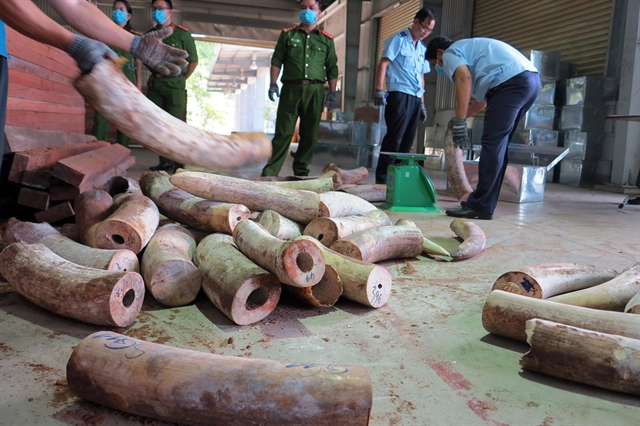 Environment
Environment

The illegal hunting and trade of wild animals has become a complex global business with tens of thousands of animals confiscated by authorities in Việt Nam alone.

|
| Đà Nẵng Customs in March this year seized 9.1 tonnes of suspicious wood blocks shipped from overseas and discovered a large number of elephant tusks hidden inside. — VNA/VNS Photo |
HÀ NỘI — The illegal hunting and trade of wild animals have become a complex global business with tens of thousands of animals confiscated by authorities in Việt Nam alone.
Although the Vietnamese Government has been working hard with domestic and international conservation organisations to curb the problem, illegal hunting and trade continue to devastate the region’s wild animals and biodiversity.
Việt Nam is home to many species which are threatened with extinction with 407 animals in the Red Book of Việt Nam classed as rare to endangered, and seven others listed among the 100 most endangered species in the world – mostly due to hunting.
Take the green sea turtle as an example. Known in Việt Nam as 'vích', the creature used to be common with dozens of thousands of turtles laying their eggs on the beaches every year prior to the 80s, but now the number of individuals is barely past 500. Yet the species is still faring better than the famous đồi mồi of the same family, which has been hunted down for its shells to make decorative items to the extent there are less than 10 animals left.
Dr Vương Tiến Mạnh, an official at the Convention on International Trade in Endangered Species of Wild Fauna and Flora Việt Nam (Cites Việt Nam), said the issue stemmed from both traditional and emerging threats.
“In the past, when the economy was yet to develop, people consumed wild animals such as crabs, frogs, shellfish or even snakes as a way to supplement protein. This was common among people living in forest areas and the Cửu Long Delta Region,” said Mạnh.
This habit was part of their tradition coupled with the fact that they don’t really have a sense of protecting animals and plants or access to information that carried this message, the expert said.
On the other hand, there are a large number of people who consume wild animals for medical purposes.
Seventy-one per cent said wild animals were consumed as a mean of treating diseases, while 21 per cent said they boosted health, according to a Cites’ survey, Manh said.
Wild animals and animal parts have become commercial goods and a fashionable trend with elephant tusks or rhino horn acting as a status symbol.
Corruption and illegal protection by criminal gangs also contribute to thwarted efforts to investigate and prosecute wildlife crimes.
Inadequate regulations
According to statistics from the Forest Ranger Department, since 2010, forest rangers had discovered more than 140,000 violations on forest and forestry product management, of which violations relating to wild animal management numbered 3,823.
Forest rangers seized nearly 59,000 animals, of which 3,078 were rare or endangered species.
The illegally hunting and trade of rare animals had been expanding across the country, but the number of cases brought to court was very low, reported Vietnam News Agency.
Figures from the Supreme Court showed that from October 2015 to the end of July 2017, Vietnamese courts took up a total of 231 cases with 339 defendants, and nearly 90 per cent of them were brought to trial.
However, only three defendants were handed prison sentences of longer than three years, while the remaining 37 received shorter terms.
Captain Trần Thị Kim Thanh from the Environment Police said there were many legal regulations that exposed shortcomings causing difficulties in the process of dealing with the trafficking of wild animals.
Moreover, international co-operation in information sharing, investigation and arresting criminals remained ineffective, Thanh said.
Large shipments of tusks, rhino horns and pangolins originating from African countries or Indonesia were being transported through many countries before arriving in China or Việt Nam, where local use of wild animal products remains widespread among certain groups of people.
However, it is difficult for enforcement agencies and NGOs from different countries to join forces to prevent trafficking or to arrest the culprits because information is not shared due to a lack of mutual legal assistance agreements or other forms of cooperation.
Measures needed
According to Bùi Thị Hà, vice director of Education for Nature – Việt Nam (ENV), a Vietnamese non-governmental organisation, 10 urgent actions were needed to put an end to illegal hunting and trade of wild rare and endangered animals in the country.
The actions include stepping up investigations and issuing strict fines to those who lead illegal rings, a resolute ban on the sale of wild animal products and the destruction of any seized product, permanently closing all private tiger, bear or any other wild animal breeding farms, holding local governments accountable for the wild animal trade in their jurisdictions, and effectively deterring illegal trading on the internet.
Meanwhile, director of the Wild Animal Conservation Centre Nguyễn Văn Thái, said: “Việt Nam needed to complete and ensure consistent legal documents related to the protection of wild animals and plants.”
“The Government should issue policies that encourage domestic and international organisations to launch campaigns to raise awareness and dissuade people from using wild animals and plants,” Thái said.
The campaigns should aim at changing local habits of consuming wild animals and plants as well as urging a zero-tolerance attitude against such actions, he added.
Authorities should also create sustainable jobs for those whose livelihoods depend on wildlife and nature to reduce the hunting of wild animals.
People living in buffer zones near national parks, conservation areas and preventive forests should be encouraged to take part in wildlife protection, said the director.
At present, the Ministry of Agriculture and Rural Development is drafting a decree on the management of wild, rare and critically endangered animals and plants and the implementation of international conventions to stop the trade. This decree aims to streamline many international protection provisions into Vietnamese legal regulations to ensure a transparent and fair implementation of the law. — VNS